Best Christian Health Insurance Options for 2025
- dustinjohnson5
- Apr 8, 2025
- 15 min read
Finding Faith-Based Healthcare in 2025
Looking for health coverage that aligns with your Christian values? This guide simplifies your search. We've compiled seven resources, including faith-based insurance options and health sharing ministries, to help you find the right fit. Discover key details on features, benefits, drawbacks, and costs for: America First Financial, Medi-Share, Christian Healthcare Ministries (CHM), Samaritan Ministries, Liberty HealthShare, Solidarity HealthShare, and United Refuah HealthShare. These options provide alternatives to traditional insurance, potentially saving you money while adhering to your beliefs. This list makes comparing faith-based healthcare straightforward.
1. America First Financial
America First Financial caters specifically to conservative American families and individuals seeking insurance solutions aligned with their values. They prioritize family welfare, retirement security, and overall well-being by offering a comprehensive suite of products, including term life, disability, annuities, long-term care, and comprehensive health care plans. This makes them a potentially attractive option for those who prefer a provider that reflects their traditional values and avoids incorporating modern political influences into their business practices. For budget-conscious consumers, the promise of affordable solutions is particularly appealing. Those approaching retirement may find their focus on securing retirement income through annuities and long-term care planning especially beneficial.
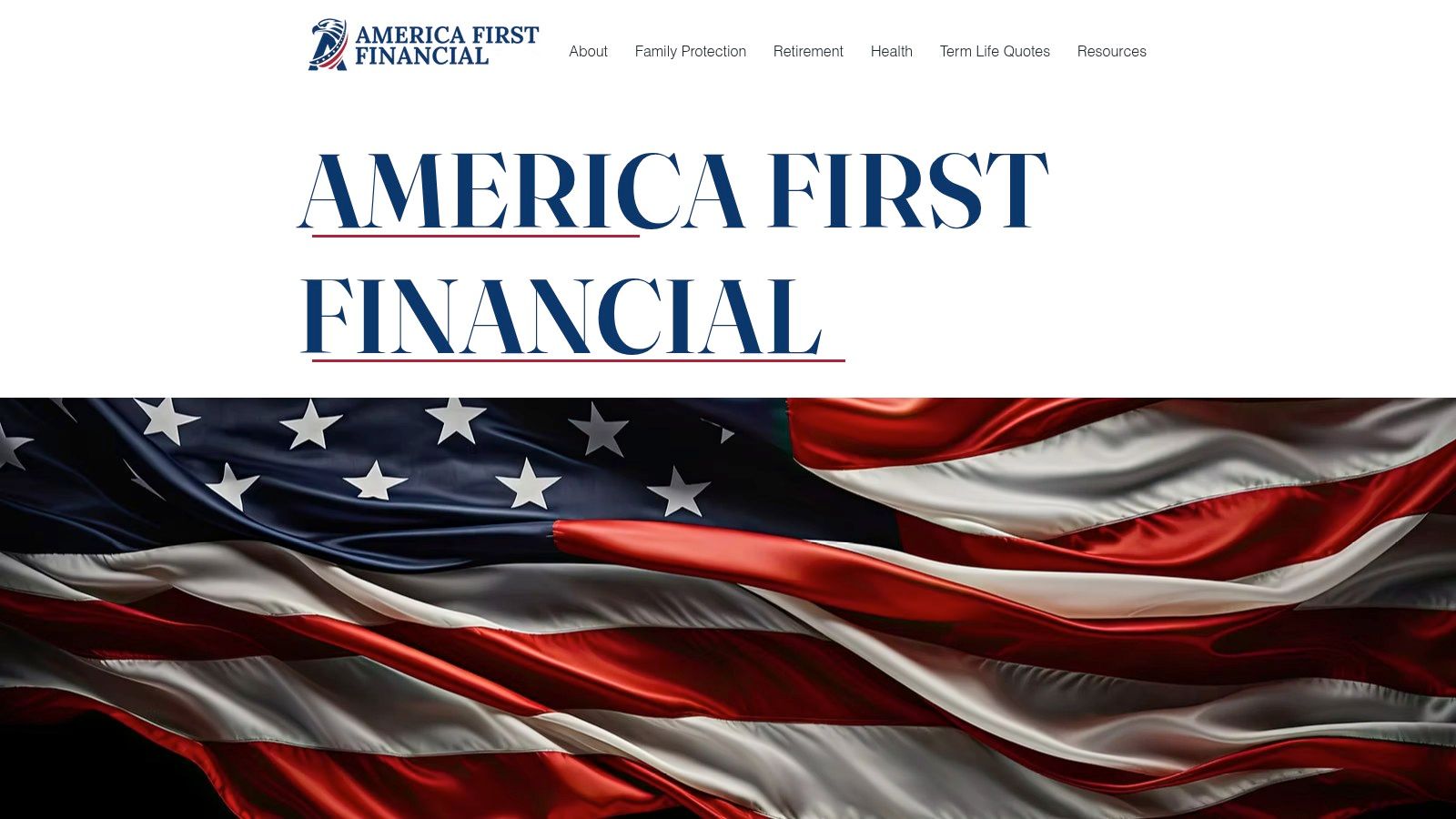
One of America First Financial's key features is its streamlined online quoting tool. This user-friendly system promises to deliver tailored coverage options in under three minutes, making it convenient for busy families and individuals to quickly explore potential plans. While the speed and convenience are definite advantages, it’s important to note that detailed pricing and premium comparisons are not readily transparent on the website. This means you’ll likely need to proceed further into the application process to get specific cost information. This lack of upfront pricing transparency can be a drawback for consumers who prefer to compare detailed costs across multiple providers before engaging further.
While America First Financial emphasizes affordability, the exact pricing structure and premium details are not readily available on their website. This lack of transparency necessitates direct engagement with their platform or representatives for specific cost information. The company's commitment to donating a portion of every dollar earned to philanthropic causes resonates with those who value charitable giving and community support. This focus on philanthropy further reinforces their alignment with traditional values and community involvement, a potential draw for certain individuals.
Pros:
Wide Range of Products: Offers a comprehensive suite of insurance solutions tailored for conservative and budget-minded consumers.
Quick and Easy Quoting: The online quote system provides personalized coverage options in under three minutes.
Traditional Values Focus: Avoids politically charged influences and caters to those seeking providers aligned with traditional values.
Philanthropic Commitment: Donates a portion of earnings to philanthropic causes.
Emphasis on Family Welfare: Prioritizes securing family welfare, retirement, and long-term financial stability.
Cons:
Limited Ideological Perspective: May not appeal to those seeking providers with broader or more progressive viewpoints.
Lack of Pricing Transparency: Detailed pricing and premium comparisons are not readily available on the website.
America First Financial earns its place on this list by directly addressing the needs of a specific niche: conservative Americans seeking insurance solutions aligned with their values. Its emphasis on affordability, family security, and traditional principles, combined with a convenient online quoting system, makes it a worthy contender for this target audience. However, the lack of readily available pricing details and its potentially narrow ideological appeal should be considered before making a decision.
2. Medi-Share
Medi-Share is a prominent Christian healthcare sharing ministry, offering an alternative to traditional health insurance for like-minded individuals. Founded in 1993 and serving over 400,000 members, it operates on the principle of members sharing each other's eligible medical expenses. This approach resonates with many families seeking a faith-based and community-focused healthcare solution. This makes it a particularly attractive option for conservative American families, individuals approaching retirement, and budget-minded shoppers looking for alternatives to traditional insurance. Its longevity and large membership base provide a sense of stability and shared responsibility.
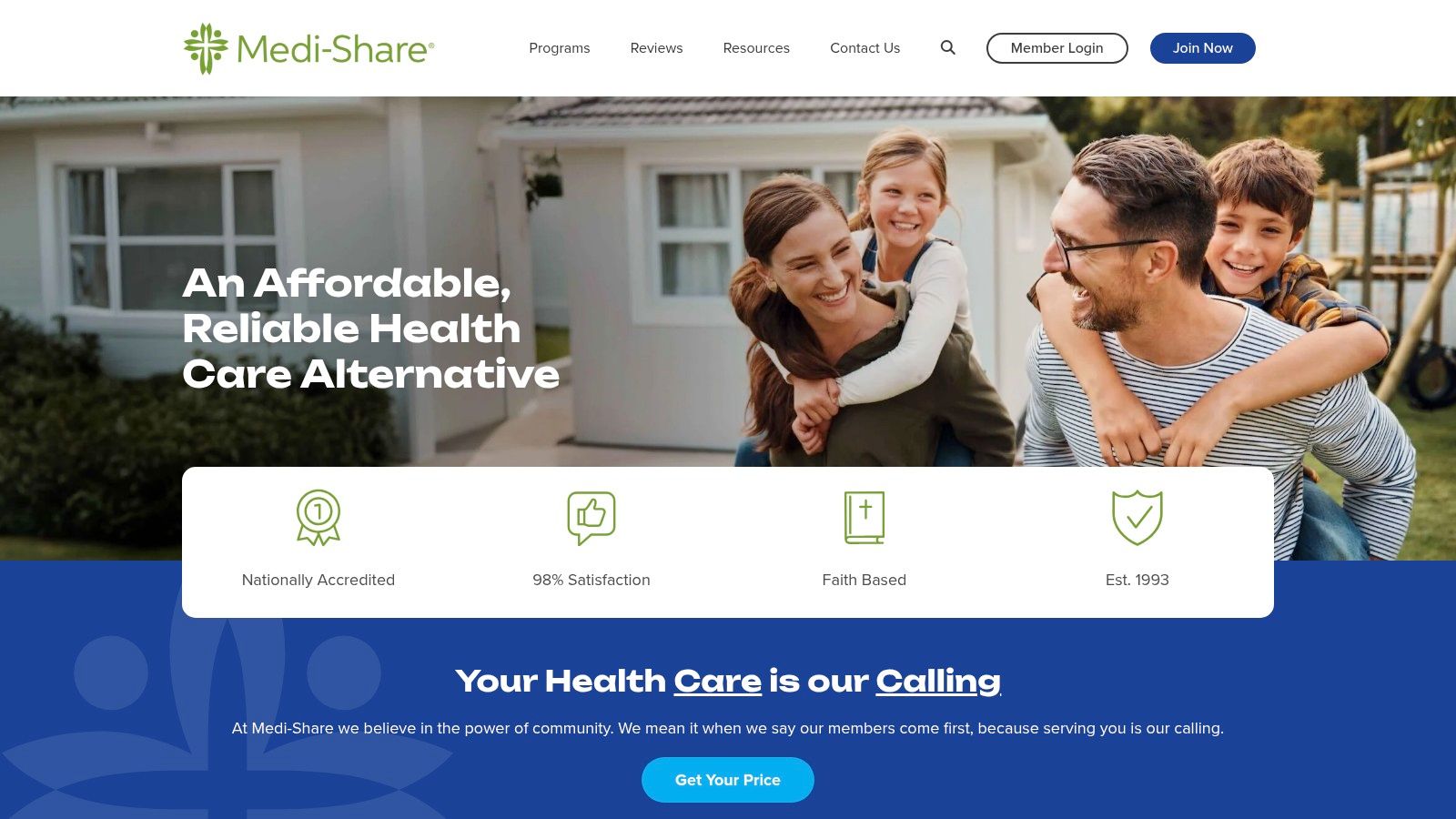
Medi-Share offers various Annual Household Portion (AHP) options, ranging from $3,000 to $12,000. This AHP functions similarly to a deductible, meaning you are responsible for medical costs up to your chosen AHP amount. Monthly share amounts vary based on factors like age, household size, and chosen AHP, with most families paying between $300 and $600 per month. This can be significantly lower than traditional insurance premiums, making it appealing for budget-conscious individuals and families. For example, a family of four might find that a $5,000 AHP coupled with a $450 monthly share provides comparable coverage to a traditional plan with a high deductible, but at a lower overall cost.
Key features include direct provider payment for many medical services, simplifying the billing process. Telehealth consultations are included at no additional cost, providing convenient access to medical advice. Medi-Share also provides access to the PHCS PPO network, allowing members to access discounted rates from participating providers. For members aged 65 and older, the Senior Assist program offers additional support and resources. This can be particularly beneficial for individuals approaching retirement who are looking for affordable healthcare options.
Implementation Tip: When considering Medi-Share, carefully compare the AHP options and monthly share costs to your current healthcare expenses. Use their online tools or contact their representatives to get personalized estimates based on your family's needs. It's also crucial to understand what is and isn't eligible for sharing.
Pros:
Established and Stable: Over 25 years of operation and a large membership base offer stability and reliability.
Convenient Management: A mobile app simplifies membership management and bill submission.
Cost Savings: Provider fee negotiation services can help reduce your out-of-pocket medical costs.
No Sharing Caps: No lifetime or annual sharing limits on eligible expenses provide peace of mind.
Cons:
Pre-Existing Conditions: Limited sharing or waiting periods may apply to pre-existing conditions. This is a crucial factor to consider if you have existing health concerns.
Not Insurance: Medi-Share is not traditional insurance and is not subject to the same regulations. This means it may not offer the same consumer protections as regulated insurance plans.
Limited Preventive Care: Some preventive care and routine check-ups may not be eligible for sharing.
Prescription Program: Prescription sharing requires enrollment in their optional program, adding to the overall monthly cost.
Website: https://www.medishare.com/
Medi-Share deserves a place on this list because it provides a viable alternative to traditional health insurance for those seeking a faith-based, community-focused approach. While it has limitations regarding pre-existing conditions and coverage for preventive care, its cost-sharing model and commitment to biblical principles make it a compelling option for the target audience. It is particularly relevant for those seeking a value-driven, faith-based healthcare solution and who are comfortable with the shared responsibility model inherent in healthcare sharing ministries.
3. Christian Healthcare Ministries (CHM)
Christian Healthcare Ministries (CHM) stands out as the oldest and one of the most respected Christian health cost-sharing ministries, having served members since 1981. Instead of traditional insurance premiums, members contribute monthly shares to a collective pool, which is then used to pay eligible medical bills for fellow members. This model aligns with core Christian values of community and mutual support, appealing to those seeking a faith-based alternative to conventional health insurance. CHM's longevity and track record of sharing over $5 billion in medical bills offer a sense of stability and reliability for potential members.
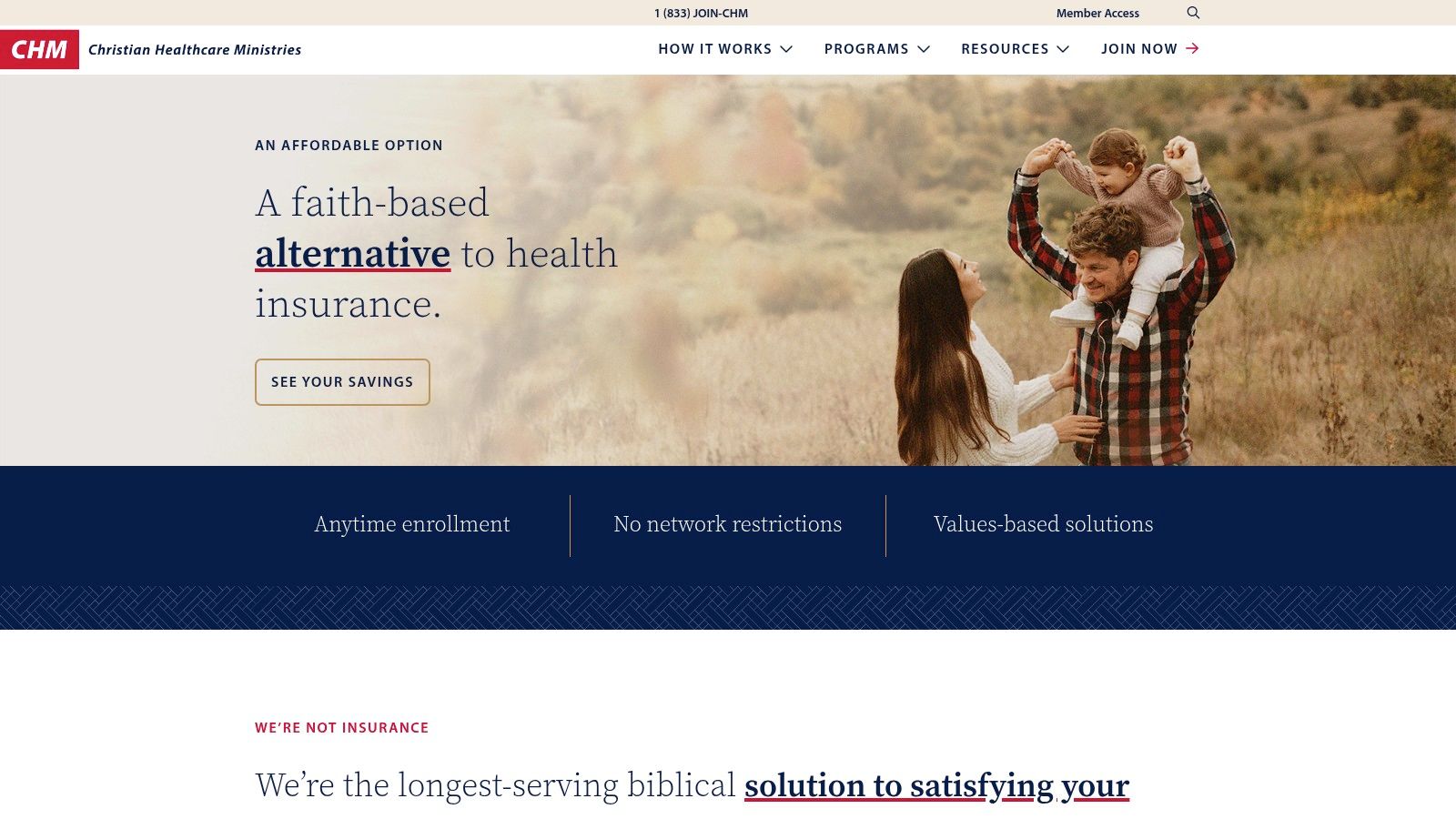
CHM offers three tiered program levels – Gold, Silver, and Bronze – catering to different budgetary needs and coverage preferences. Monthly contributions range from $78 for Bronze to $172 for Gold per "unit," and households often require multiple units depending on family size and structure. The Gold level, for instance, is a good fit for families prioritizing comprehensive maternity coverage, while budget-conscious individuals might find the Bronze level more suitable. For those concerned about catastrophic medical events, the optional Brother's Keeper program provides additional financial security with no annual or lifetime maximum limits once a higher deductible is met.
A key feature of CHM is its flexibility. Members can choose any healthcare provider, eliminating the restrictions of traditional network plans. This freedom allows members to select doctors based on personal preference, faith alignment, or specialized care needs. Additionally, members are encouraged to negotiate self-pay discounts with providers, potentially leading to further cost savings. This empowers members to take an active role in managing their healthcare expenses.
Implementation and Setup Tips: The application process involves completing an online application, providing health information, and affirming a Christian Statement of Faith. After acceptance, members begin making monthly contributions. When a medical need arises, members pay their provider directly and then submit the bills to CHM for reimbursement. Understanding the sharing guidelines and pre-existing condition stipulations beforehand is crucial for a smooth experience.
Pros:
Affordability: CHM often presents a more affordable option compared to traditional health insurance, particularly for healthy individuals and families.
No Annual or Lifetime Limits (with Brother's Keeper): Offers peace of mind for catastrophic events.
Clear Guidelines: Provides a predictable cost structure with well-defined sharing eligibility.
Provider Flexibility: No network restrictions allow members to see any doctor.
Self-Pay Discounts: Empowers members to negotiate lower costs with providers.
Cons:
Reimbursement Model: Requires members to pay upfront and then seek reimbursement.
Personal Responsibility Amounts: Members must meet a deductible ($500 - $5,000 per illness depending on the program level) before sharing begins.
Pre-Existing Conditions: Limited sharing for pre-existing conditions during the initial period of membership.
No Preferred Provider Network: While offering flexibility, the lack of a network means no automatic discounts.
Website: https://www.chministries.org/
CHM offers a compelling alternative for individuals and families seeking a faith-based, community-focused healthcare solution. Its affordability, flexible provider choice, and clearly defined guidelines make it a strong contender for those prioritizing cost savings and aligning their healthcare with their Christian values. However, the reimbursement model and pre-existing condition limitations require careful consideration. For conservative American families, individuals approaching retirement, and budget-minded insurance shoppers, CHM presents a worthwhile option to explore.
4. Samaritan Ministries
Samaritan Ministries distinguishes itself from traditional health insurance and even other health sharing ministries with its direct member-to-member sharing model. Instead of paying premiums to a central pool, members send their monthly share directly to other members in need. This fosters a strong sense of community and shared responsibility, appealing to those seeking a faith-based, personalized approach to healthcare costs. Imagine receiving notes of encouragement and prayer along with financial assistance during a medical hardship – this is the heart of Samaritan Ministries. It aligns particularly well with conservative American families and individuals prioritizing Christian values.
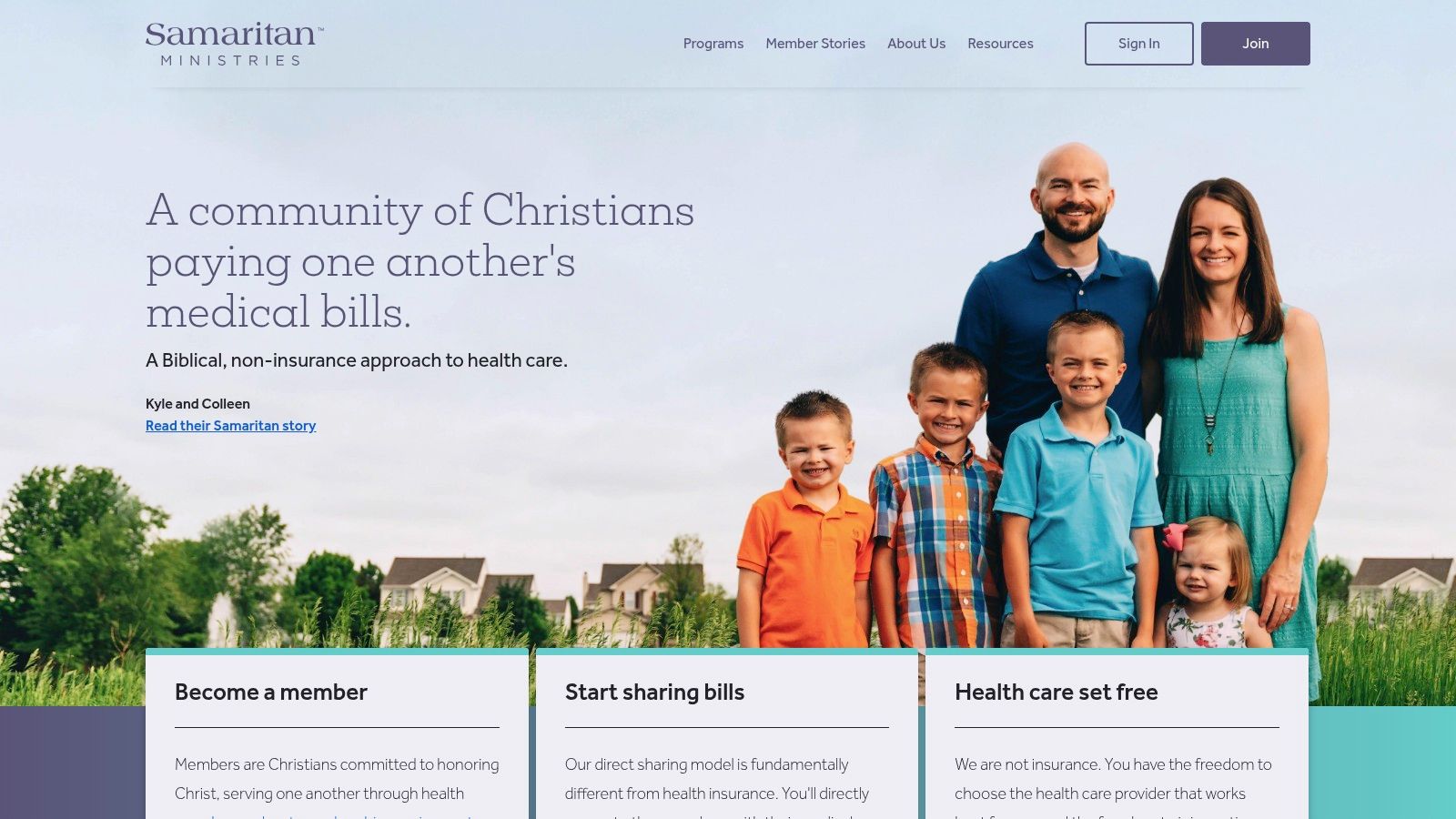
Samaritan Ministries offers two primary programs: Samaritan Classic and Samaritan Basic. Samaritan Classic shares 100% of eligible medical needs after a $400 personal responsibility amount, up to $250,000 per need. For expenses beyond $250,000, the "Save to Share" program kicks in, leveraging collective funds accumulated by members for catastrophic events. Samaritan Basic, designed for budget-minded individuals and families, offers a lower monthly share amount but also a lower sharing threshold, making it a potentially attractive option for younger, healthy individuals. Specific pricing details for both programs are available on their website and vary based on family size and age.
Unlike traditional insurance with network restrictions, Samaritan Ministries provides complete freedom of provider choice. You can see any doctor or specialist without worrying about network coverage, which can be a significant advantage for those who value flexibility and personalized care. HealthCare Bluebook access, a feature offered to members, empowers informed decision-making by providing fair pricing information for medical procedures, allowing members to negotiate costs and potentially save money.
Implementation Tips:
Review the guidelines: Carefully examine Samaritan Ministries’ guidelines for eligible medical expenses and pre-existing condition limitations before joining. This will help avoid surprises and ensure your needs align with their sharing philosophy.
Understand the sharing process: Familiarize yourself with the direct sharing process, including how to submit needs and receive shares.
Budget for your share: Factor your monthly share amount into your budget, recognizing that it functions differently than traditional insurance premiums.
Engage with the community: Participate in the community aspect of Samaritan Ministries, as it’s a core element of their model.
Pros:
Personalized sharing model with a strong community focus.
Prayer support and encouragement from fellow members.
Transparent and relatively simple sharing process.
Freedom of provider choice.
Discounts available for healthy lifestyles and young adults.
Cons:
Reimbursement can be slower compared to traditional insurance.
Limitations on sharing for some pre-existing conditions.
Membership caps for certain conditions like mental health treatment.
Requires adherence to specific submission guidelines.
Samaritan Ministries earns its place on this list by offering a unique, faith-based alternative to traditional health insurance. While it's essential to weigh the pros and cons carefully and ensure it aligns with your individual needs and beliefs, it presents a compelling option for individuals approaching retirement, health-conscious consumers, and budget-minded insurance shoppers seeking a community-centered, cost-sharing solution rooted in Christian principles. Learn more at https://www.samaritanministries.org/.
5. Liberty HealthShare
Liberty HealthShare offers a faith-based alternative to traditional health insurance, appealing to those seeking healthcare solutions aligned with their Christian values. Operated by the Gospel Light Mennonite Church Medical Aid Plan, Inc., it operates on a cost-sharing model where members contribute monthly to a pool of funds used to pay for eligible medical expenses of other members. This approach fosters a sense of community and mutual support, resonating with many conservative American families and individuals seeking options outside the conventional insurance landscape. Liberty HealthShare provides several program options to cater to diverse financial situations, making it attractive to budget-minded insurance shoppers and those approaching retirement.
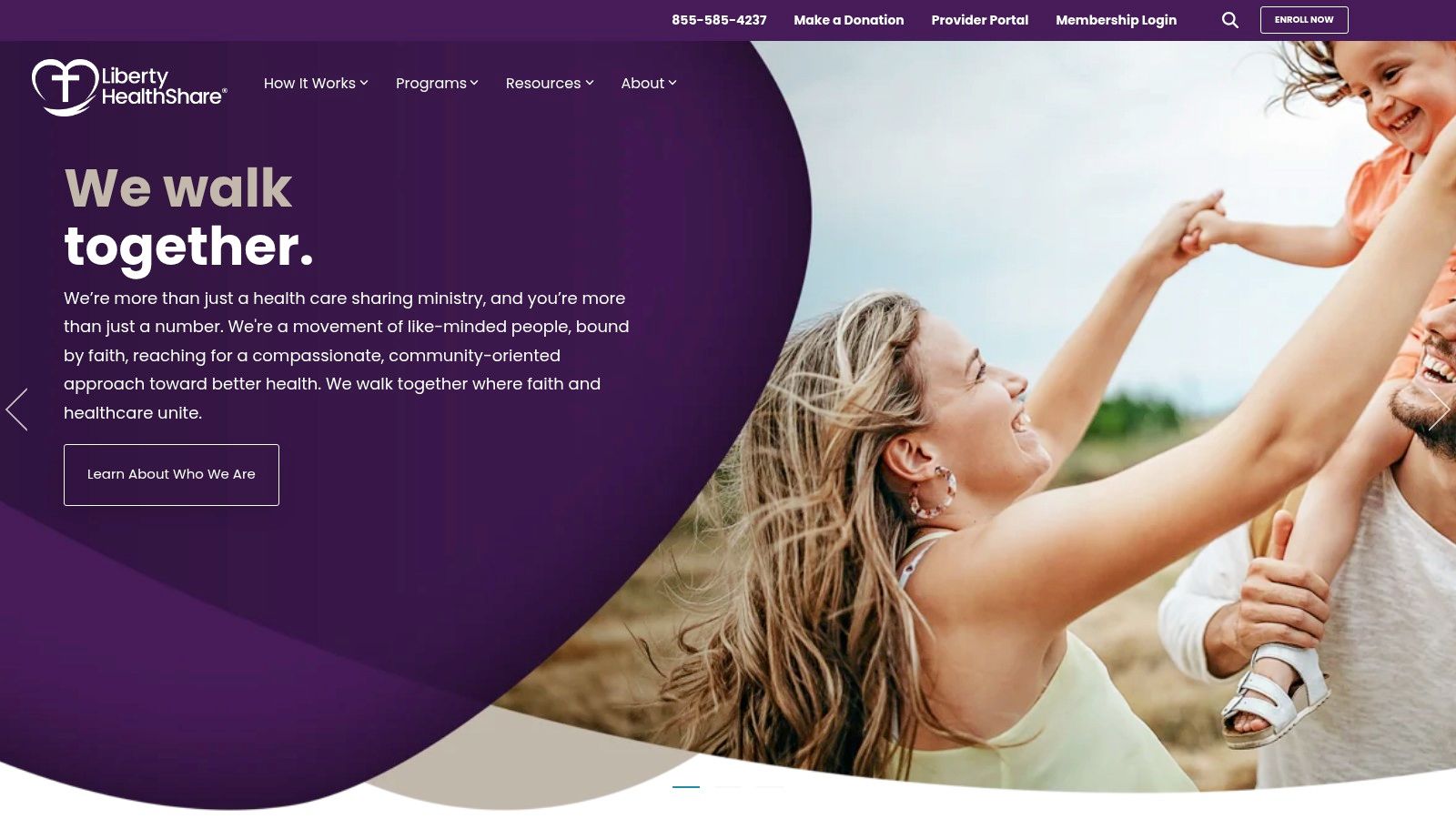
Liberty HealthShare offers three primary programs: Liberty Unite, Liberty Connect, and Liberty Essential. Each program has different Annual Unshared Amounts (AUA), which function similarly to deductibles in traditional insurance. These range from $1,000 to $2,250 for singles, with higher amounts for families. Your monthly contribution depends on the program you choose and factors like family size and age. While specific pricing isn't readily available on the website, prospective members can obtain personalized quotes through an online form. This tiered structure allows individuals and families to select a program that aligns with their budget and anticipated healthcare needs.
This healthcare sharing ministry deserves a place on this list because it provides a viable alternative for those seeking a faith-based and potentially more affordable approach to healthcare. The absence of a specific enrollment period allows individuals to join anytime throughout the year, offering flexibility not always found with traditional insurance. Liberty HealthShare leverages the ShareBox technology platform, a user-friendly online portal that simplifies managing your sharing account and submitting eligible medical expenses. Furthermore, members can access discounted healthcare services through Healthcare Bluebook, potentially leading to significant cost savings. Medical expenses are shared up to $1 million per incident, providing substantial coverage for major health events.
Practical Applications & Use Cases:
Large Families: Liberty HealthShare's family plans can be attractive for larger families seeking more affordable healthcare options.
Individuals Approaching Retirement: With potentially lower monthly contributions than traditional insurance, it can be an appealing option for those on a fixed income.
Health-Conscious Consumers: While not insurance, the sharing programs cover preventive services, encouraging proactive health management.
Implementation & Setup Tips:
Carefully review the guidelines for pre-existing conditions. Liberty HealthShare has a two-year graduated sharing period for these, which means sharing for those conditions may be limited initially.
Be aware of the lifestyle restrictions based on Christian principles. These might include restrictions related to tobacco use and alcohol consumption.
Familiarize yourself with the ShareBox platform to streamline the sharing process.
Contact Liberty HealthShare directly to obtain a personalized quote and discuss which program best suits your needs.
Pros:
Potentially lower monthly costs than traditional insurance.
Sharing for preventive services available.
Flexibility to choose your own healthcare providers.
No specific enrollment period.
Cons:
Two-year graduated sharing for pre-existing conditions.
Some lifestyle restrictions.
Potential for slower processing times for some medical bills.
Recent history of significant annual price increases.
Website: https://www.libertyhealthshare.org/
6. Solidarity HealthShare
Solidarity HealthShare distinguishes itself as a faith-based healthcare sharing ministry deeply rooted in Catholic principles and moral teachings. While open to Christians of all denominations who align with its shared beliefs, its foundation in Catholic social teaching makes it particularly appealing to conservative families seeking healthcare options that reflect their values. Solidarity emphasizes community, ethical healthcare practices, and transparency in its operations, aiming to provide an alternative to traditional health insurance.
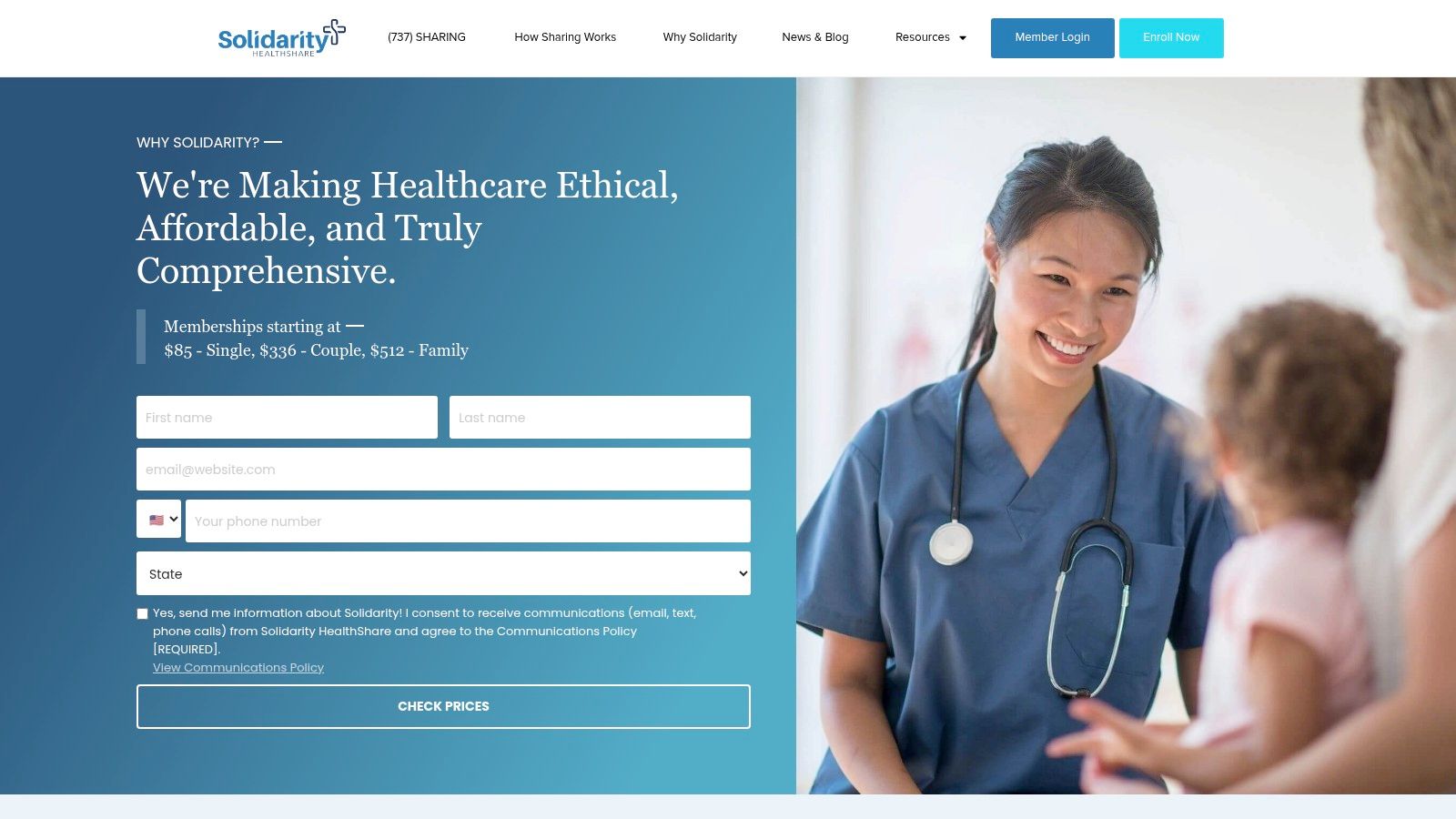
For budget-minded families and individuals approaching retirement, Solidarity's cost-sharing structure can be an attractive alternative to rising insurance premiums. Members contribute a monthly share amount, which helps cover the eligible medical expenses of other members in the community. This shared responsibility aligns with the ministry's emphasis on mutual support and Christian charity. It's important to understand, however, that this isn't insurance. There's no guarantee that all medical costs will be shared, and members are responsible for an annual unshared amount (currently $3,000 for individuals and $5,000 for families).
Practical Applications and Use Cases:
Large families: Solidarity offers a family membership, making it a potentially cost-effective option for larger families who share similar religious beliefs.
Individuals with pre-existing conditions: While Solidarity does share costs for pre-existing conditions, it uses a graduated sharing schedule. Understanding this schedule is crucial for those with pre-existing conditions when evaluating the ministry's suitability.
Those seeking ethically aligned healthcare: Solidarity explicitly aligns its sharing practices with Catholic moral teaching. This is particularly relevant for individuals and families seeking healthcare options that respect the sanctity of life and align with their religious beliefs regarding issues like abortion and end-of-life care.
Individuals comfortable with shared decision-making: Solidarity incorporates member voting on certain policy decisions, promoting community engagement and transparency within the ministry.
Features and Benefits:
Prescription Sharing Program: Inclusion of prescription coverage in the membership adds value and simplifies managing healthcare costs.
No Network Restrictions: Members have the freedom to choose their healthcare providers, offering flexibility and potentially lower costs.
Sharing for Certain Alternative Treatments: This feature caters to members interested in holistic or complementary medicine, offering a broader range of healthcare options.
Transparency: Solidarity emphasizes open communication and member involvement in decision-making, fostering trust and community.
Pros and Cons:
Pros:
Strong ethical foundation rooted in Catholic moral teaching.
Covers legitimate medical needs, including some natural family planning methods.
Transparent decision-making process with member involvement.
Cons:
Smaller membership base compared to larger healthcare sharing ministries. Graduated sharing schedule for pre-existing conditions requires careful consideration.
Some preventive care may not qualify for sharing.
Limited sharing for certain specialized treatments.
Implementation/Setup Tips:
Carefully review the membership guidelines and shared belief statement to ensure alignment with your values and healthcare needs. Contact Solidarity directly to discuss your specific situation, particularly if you have pre-existing conditions. Compare the costs and coverage with traditional health insurance and other healthcare sharing ministries to determine the best fit for your family.
Solidarity HealthShare earns its place on this list by providing a values-based alternative to traditional health insurance. Its focus on community, ethical healthcare, and transparent operations caters specifically to conservative families and individuals seeking a faith-based approach to managing healthcare costs. However, potential members must carefully consider the ministry's specific guidelines, particularly regarding pre-existing conditions and coverage limitations, to make an informed decision.
7. United Refuah HealthShare
United Refuah HealthShare offers a faith-based healthcare sharing alternative rooted in Jewish values, but welcoming to individuals of all faiths who align with their ethical guidelines. This makes it a compelling option for conservative families, budget-minded individuals, and those seeking healthcare solutions aligned with a strong ethical framework. It's designed to be a more affordable and transparent approach to healthcare, emphasizing community support and predictable monthly contributions. This approach may particularly appeal to those approaching retirement who are looking for ways to manage healthcare costs while adhering to their values.
United Refuah's straightforward three-tiered program structure simplifies the sharing process. Members choose a sharing level ($1,000, $2,000, or $3,000) representing the amount they contribute towards eligible medical expenses per incident before sharing begins. Monthly share amounts range from $219 for individuals to $569 for families, potentially offering significant savings compared to traditional health insurance premiums, a crucial factor for budget-conscious consumers.
The program covers a broad range of healthcare needs, including preventive care, wellness visits, and even alternative medicine treatments. This focus on wellness aligns with health-conscious consumers and incentivizes proactive health management. The absence of network restrictions allows members to choose any healthcare provider, offering flexibility and potentially better access to preferred doctors. This is a particularly beneficial feature for individuals living in rural areas or those who have established relationships with specific practitioners.
For conservative families and individuals wary of complex insurance plans, United Refuah's simple sharing structure offers a refreshing alternative. The clear guidelines and predictable monthly costs contribute to a sense of financial stability and control, valuable features for those approaching retirement or managing a household budget.
While United Refuah presents several advantages, it's essential to consider potential drawbacks. Its smaller membership base compared to larger Christian sharing ministries could impact the speed and volume of shared expenses. There's a maximum sharing limit of $1 million per incident, and pre-existing conditions have limited coverage initially. It's also a relatively newer ministry, which might be a consideration for those seeking a more established healthcare sharing community.
Implementation Tip: Before joining, carefully review United Refuah’s guidelines to ensure they align with your healthcare needs and ethical values. Consider your family's medical history, anticipated healthcare expenses, and comfort level with sharing within a community. Compare the monthly share amounts and sharing levels with your current insurance premiums and out-of-pocket expenses. Contact United Refuah directly with any questions about specific coverage details or the application process.
United Refuah HealthShare earns its place on this list by offering a transparent, ethically grounded, and potentially cost-effective healthcare sharing option. It’s particularly well-suited for individuals and families seeking a values-based approach to healthcare and willing to participate in a community-focused model. For more information and to explore their program options, visit https://www.unitedrefuahhs.org/.
7 Christian Health Insurance Services Comparison
Provider | Core Features (✨) | User Experience (★) | Value Proposition (💰) | Target Audience (👥) |
|---|---|---|---|---|
🏆 America First Financial | Term Life, Disability, Annuities, LT Care | 3-min online quotes, streamlined process | Affordable plans, philanthropic support | Conservative, patriotic families |
Medi-Share | Christian sharing, PHCS PPO network, Telehealth | Mobile app management, 25+ years experience | Flexible monthly shares, cost-sharing model | Christian healthcare seekers |
Christian Healthcare Ministries | 3 program levels, Brother's Keeper, no network limits | Predictable cost structure, affordable options | Low monthly costs, clear sharing guidelines | Christian families |
Samaritan Ministries | Direct member sharing, Bluebook pricing, community support | Personalized, transparent process | Community discounts, affordable sharing | Faith-driven communities |
Liberty HealthShare | Multiple programs, ShareBox tech, provider choice | Easy app management, open enrollment anytime | Lower monthly costs, preventive sharing | Faith & value focused families |
Solidarity HealthShare | Ethical sharing, prescription inclusion, member voting | Transparent process, ethical care approach | Value-based sharing, alternative treatment options | Catholic/Christian aligned individuals |
United Refuah HealthShare | 3-tier structure, wellness benefits, no network restrictions | Simple, predictable process | Affordable sharing, preventive care benefits | Multi-faith, cost-conscious families |
Choosing the Right Christian Healthcare Path
Navigating the landscape of Christian healthcare options can feel overwhelming, but with the right tools and information, you can find a plan that aligns with your values and budget. This article explored several prominent options, from traditional Christian health insurance plans to faith-based healthcare sharing ministries like Medi-Share, Christian Healthcare Ministries (CHM), Samaritan Ministries, Liberty HealthShare, Solidarity HealthShare, and United Refuah HealthShare. Each offers unique benefits and limitations regarding cost, coverage, and membership requirements. The key takeaway is that there is no one-size-fits-all solution. Your choice depends on your specific healthcare needs, financial situation, and personal beliefs.
When evaluating these options, consider factors like pre-existing condition coverage, shared responsibility amounts, eligible medical expenses, and the size and stability of the sharing community. Remember, healthcare sharing ministries operate outside traditional insurance regulations, meaning they don't offer the same consumer protections. Thoroughly research each option, compare plans side-by-side, and ask questions to ensure you understand the details before making a commitment.
Finding affordable, faith-based healthcare is a priority for many families. By carefully weighing the options presented in this article and considering your individual needs, you can make an informed decision that provides peace of mind for you and your loved ones.
For further guidance on navigating Christian financial planning, including healthcare options, explore the resources available at America First Financial, a trusted resource for patriotic Americans seeking faith-based financial solutions. America First Financial offers valuable insights and support to help you build a strong financial future based on conservative principles. They can also help evaluate how faith-based healthcare options integrate into your broader financial strategy.
_edited.png)
Comments